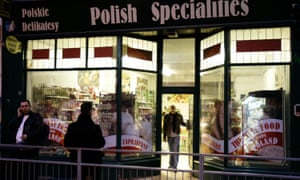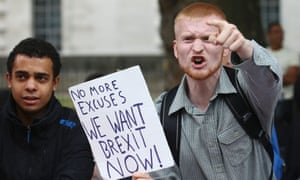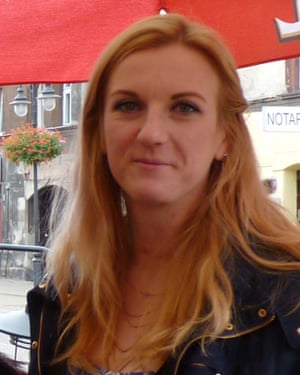'I don't speak my native language in public': eastern Europeans on post-referendum life
The decision to leave the EU has led to a rise in hate crimes, with eastern Europeans targeted. How has this left many of them feeling?

Since Britain’s decision to leave the European Union there has been a spike in hate crimes, with much of this negativity directed towards eastern Europeans.
The Guardian’s Gary Younge recently reported on this and the general sense of unease as a result – documenting eggs thrown and windows smashed in Bristol. The death of Arkadiusz Jóźwik in Harlow has also brought this topic into sharp focus: Jóźwik was beaten to death in what is being investigated as a suspected hate crime. In the same town, police are now investigating another incident along similar lines. This time, two Polish men were attacked following a remembrance march for Jóźwik.
We asked eastern Europeans to talk about how they feel after the referendum. Here are some excerpts from the comments we received, condensed and edited for clarity.
Shannon, 27, graphic designer, London
I hold dual Canadian-Polish citizenship, but grew up in Canada. Because of this, British people think they can talk openly about their dislike for Polish immigrants without knowing I am one.
Before the referendum, people would make jokes about unskilled Polish plumbers. It hurt. I’ve heard horrible stories of how people can be treated here and friends have said that Polish colleagues working in restaurants have been chastised for not being able to speak English properly. They all speak it perfectly.
I believe there’s an image of Poles as plumbers and benefit scroungers, here to steal jobs, but that’s rarely the case – and most give back a lot to Britain.
Will I be allowed to stay long-term? There are so many unanswered questions from the government and much uncertainty lies ahead. But perhaps it’s better to ask, do I want to stay in a country that doesn’t want me?
Thomas, 33, works in a restaurant
I am originally from Poland and I have two bosses where I work. The day after the referendum result, one of them apologised for the misguided people who voted leave, the other one just kept asking cheerfully, “What are you still doing here?”
Tee, 22, paralegal, London
I came here from Russia when I was six. As a child, I experienced racism at school – people telling me to go back to my country and refusing to go near me. But, before the referendum, I had a real sense of patriotism about England. I was on the verge of homelessness a few years ago and people in my local community found me a place to stay and helped me get on benefits. Because of that, I felt very at home here. I wanted to give something back.
However, the referendum result showed me that people don’t really want immigrants here. Nigel Farage’s racist and hateful brand of politics won. I don’t feel connected to Britain any more – I feel disappointed. I look and sound British, so luckily I haven’t experienced any racism. I have British citizenship and I am trying to establish a career here. I don’t want to leave.

Alexandra, 25, from Birmingham
Have you ever had that nightmare where you go to school and realise that you’re naked and everyone is staring at you? That’s how I feel now. I haven’t changed, I haven’t done anything differently, yet I feel like I’m constantly being watched, as if someone is just waiting for me to make a wrong move so they can say, “That’s it, you’re out!”
Stripped of the protective layer that the EU offered, I feel exposed and unwelcome, but maybe that was always the case.
It seems that this referendum is being used to legitimise racism, offering people the opportunity to vent their spleen against immigrants. All of a sudden, it has become OK to be a racist because more than half of the country voted leave. In the community where I live, more than 80% of the people voted leave. The lovely elderly neighbour from across the street, the friendly butcher I visit every Saturday, the smiling cashier at my local shop – do they all want me gone? Apparently so, because my neighbour stopped wishing me a “good morning”, the butcher is always busy in the back when I pop around, and the smiling cashier is not smiling back any more.
I didn’t mind the “go back to your country” jokes at the beginning, but hearing about Polish people getting attacked on the streets, Romanian shops being vandalised and hate speech in the media are constant reminders of who I am: an immigrant. And, sooner or later, I could be attacked or verbally abused as well.
I am originally from Romania – and this is embarrassing to admit – but I now avoid speaking in my native tongue whenever I’m outside the house. People stare, sometimes they even sneer or change seats on the train.

Monika, 33, paralegal, Glasgow
My own experience has been fantastic, really positive. I came here from Poland 10 years ago, and Scottish people are fantastic – maybe there’s a different view here compared with England. Most of my friends voted remain. To be honest, most of the time when I speak to people who voted leave, they said it was because of the way the refugee crisis was handled, rather than because of immigration.
Racism is bad in Poland, and everywhere in Europe seems to be the same. Racism is so common these days that we don’t find it shocking anymore. It is bad in England, but Polish people in their own country can be as bad to Ukrainians and Vietnamese refugeespeople who come over. Racist incidents in Poland are really on the rise at the moment.
Tola, 34, a web designer, Essex
I came here because I felt England would appreciate my skills, the fact that I want to learn and use all that to build something positive. After the referendum, I felt I had got it wrong. People on the street suddenly seemed different, and there was no friendly “hello” in the street. However, everything eventually went back to normal. I spoke to my neighbours, who I knew voted to leave, and I told them I understood; this is their homeland and they did what they thought was best. They seemed a bit sorry.
I have a feeling that British people wanted to change something, without fully realising the consequences. My neighbours said they welcome me and my husband here and that the vote was more about other things (for example, the security of borders).
I have experienced one racist incident, however; a parent in school said something rude to the kids about packing their stuff and leaving after the referendum, but the principal and local authorities reacted appropriately, saying that there’s no place for hate crimes in this town.
I have been here for three years. When I moved here with my husband, before the referendum, we had plans to stay, establish a business, apply for permanent residency and citizenship. We still want to do that, but everything will be more complicated now. We hope we’ll be able to comply with all new rules and requirements that a post-EU Britain will have.
Mika, 50, doctor, the Midlands
Most of my patients seem embarrassed about voting leave or cannot really explain why they did it, particularly when I ask why they want me to go back home. The NHS is propped up by many European doctors and it would struggle without us.
I have not seen any examples of abuse or racist behaviour; most people are polite and, if anything, just apologetic. Most patients think I am Swedish and even when I correct them, no one makes any negative comments. I live in a village where 90% voted leave but, as a local, I am not viewed as foreign and life for me has continued as normal.
My partner is British. I have now been here for 12 years and have applied for citizenship just in case there are problems in the future. I have a flat in my home country and could go back to a good job there with no problem. The UK benefits from me being here – it will be their loss if I return home.

Bea, 29, works for an NGO, London
My experience of living here is exactly the same after the referendum. Perhaps this is because I live in the capital and work within a truly international team (Spanish, Georgian, Colombian etc). Or perhaps I have just been lucky. It’s hard to deny the statistics showing an increase in hate crime.
I hope the UK will get out of the EU on good terms, and Europe will not punish us for leaving. If I have children in the future, it’ll be a shame if they can’t study and work abroad. I live in Hackney and I love it here. The Victoria Park community is the best; there are many languages and many ethnicities here.
Albi, 68, retired civil servant, London
I was originally born in Czechoslovakia, but have been in the UK for more than 30 years. I still have a slight accent and since Brexit I have been asked aggressively, “When are you leaving this country and going home?”
I fear about my future , even in London. My Yugoslav citizenship is no more (because Yugoslavia doesn’t exist any more), and I have therefore requested the Croatian embassy to consider me for their citizenship, just in case things deteriorate and there are more racist attacks in Britain. Clearly, my UK citizenship will not protect me when I am having my head kicked in on a pavement.
Ella, 30, architect, London
There was tension in the office at the time of the referendum; a couple of my colleagues said that there are too many Polish people here. They said this to my face. I was let go a couple of weeks after that, with my employer saying I didn’t fit the office culture. I now have a new job. I’ve just started my own business and I plan to eventually move it to Warsaw.
Emily, management, London
The EU vote was an eye-opener. Although my husband is British and I have lived here for more than 15 years, working and paying taxes, I felt alienated almost overnight. I felt almost sick on the morning following the referendum.
I felt more welcome when I first arrived here, when Poland wasn’t even in the EU. I used to think of Britain with warmth and gratitude for giving me a new home; now I just see it as a country with a massive amount of small-minded, bigoted people in it, who are totally opposed to foreigners living and working here. At the same time, these people will wave flags and cheer when Mo Farah, an immigrant to the country, wins gold. People shame benefit claimants yet don’t mind paying millions to the monarchy. The class system here has always baffled me, but Brexit only showed how rotten it is in reality.
I live in London, so haven’t experienced xenophobia as such, but my cousin living in Birmingham had dog poo thrown in her garden, and thus decided to move back to Poland. She works for the NHS. Good luck filling those jobs when more people go.
Cat, 41, works at a university
I generally do not speak much in my native eastern European language, but I am very careful now of using it in public, as I am scared of the reaction. At my workplace, people talk about eastern European scroungers and our love for vodka. I don’t comment or get involved, as there has always been a hostile and unwelcoming atmosphere towards Europeans where I work.
In general, I am very sad that European solidarity failed and people voted leave. There is enough going on in the world and we don’t need to be turning our backs on each other.
- Some names have been changed.

